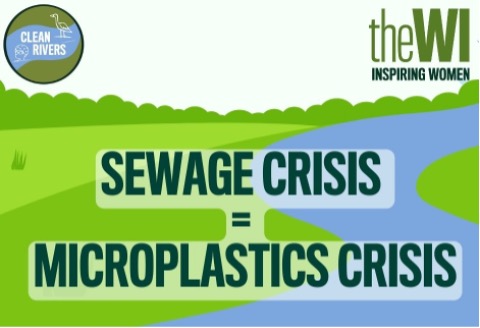The WI Week of River Action: Public want the Government to act on sewage microplastics, and overwhelmingly support regulation and testing, as WI members come together for rivers
This week marks our third annual WI Week of River Action, and we are calling on the government to get serious about microplastic pollution. This means compulsory testing of sewage for microplastics and stronger regulation of sludge in the short term, as well as a coherent plan for ‘upstream solutions’ - such as microplastic filters in washing machines and better product design.

Sewage — both raw and treated — is a major pathway for microplastics and other harmful substances to enter nature and the food chain. Even when wastewater reaches treatment plants, microplastics and other pollutants are largely retained in sewage sludge, which is spread onto farmland. Recent reports shows that the majority of microplastics make it back to nature, which according to a growing body of research, could pose a serious threat to both human health and the environment.
New WI research show broad support for government action
Our recent polling of 2000 UK adults, conducted by Opinium, reveals that the UK public overwhelmingly supports stronger regulation and testing and want the Government to act on sewage microplastics.
There is broad recognition that microplastics in sewage spills (75%) and farmland sludge (73%) is an environmental problem. When provided the scale of the problem, three quarters (74%) of the public support compulsory testing of sewage for microplastics. Similar levels of support were also found for:
- New laws to reduce microplastic pollution from sewage sludge (71%).
- Regulation of microplastic polluting industries e.g., synthetic textiles and tyres (70%).
- Mandatory microplastic filters in new washing machines (68%), even if they would cost slightly more.
Our research also shows that 44% of the public have changed their own behaviour because they are concerned about microplastic pollution, and over half (60%) think that the government and polluters are not doing enough to tackle the issue.
We call on the government to get serious about microplastic pollution.
In the short term, we need:
- Compulsory testing of sewage and sludge for microplastics.
- Stronger regulation of sludge use on farmland.
In the longer term, the government must set out a coherent plan for upstream solutions to microplastic pollution, including:
- Mandatory microplastic filters in washing machines.
- Promoting better product design and an Extended Producer Responsibility scheme which takes into account microplastic pollution at all life stages of polluting products.
WI members are coming together for our rivers
The Week of River Action will see WI members coming together to make waves against river pollution through local stunts, citizen science, craftivism and community events. From river walks and crafted protest banners, to parading the new WI Loch Mess monster on the river Wye, the WI movement will bring its creativity and determination to clean up our rivers.
Free WI Learning Hub craft session Thursday 2 October
To mark the Week of River Action, the WI Learning Hub is holding a free craft session on Thursday 2 October, where you can learn to craft the dragonfly key ring.
Monmouth Week of River Action campaign rally
On Saturday 4 October, NFWI and NFWI-Wales will mark the Week of River Action with a rally and photo stunt on the river Wye, one of the UK's most polluted rivers. In Monmouth in Gwent, WI members from Gwent, Powys Brecknock, Powys Radnor, Herefordshire and Gloucestershire federations will don river themed costumes and pose with the new WI Loch Mess monster and hear about new WI research.

It's not too late to get involved
WI members and supporters can access a range of campaign resources on MyWI to make waves this Week of River Action. Check them out here!
However you decide to mark the WI Week of River Action, actions big or small, your actions matter, and will help us show the power of the WI movement.
Don't forget to share your plans with us by getting in touch on pa@nfwi.org.uk!
